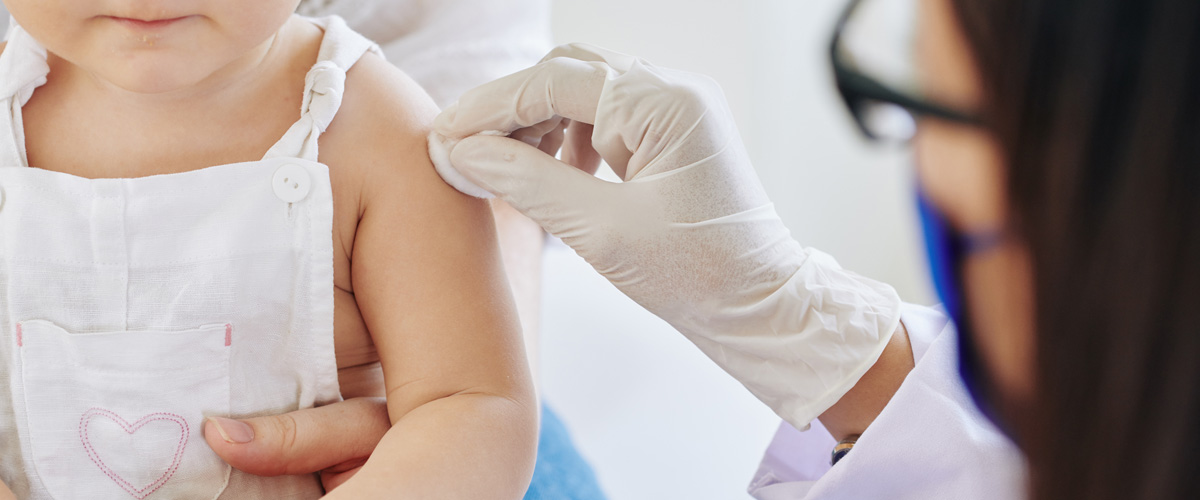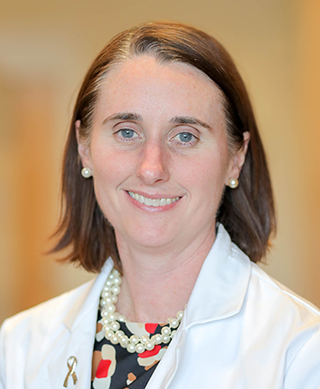COVID-19 Vaccines for Children Under 5: What to Know
An infectious diseases expert explains the safety and efficacy of the COVID-19 vaccine for children 6 months through 5 years old — and why it’s important for this age group to get vaccinated.

Children ages 6 months and older are now eligible to receive the COVID-19 vaccine.
In June, the FDA authorized and the CDC recommended the Moderna and Pfizer-BioNTech vaccines for the 6 months to 5-year-old age group, expanding eligibility for immunization to the majority of Americans.
Here are differences between the two options:
Pfizer-BioNTech
- Age range: 6 months through 4 years old
- Number of shots: Three (three-week gap between the first and second shots; at least eight-week gap between the second and third shots)
- Dosage: Three micrograms in each shot (1/10 of the adult dosage)
Moderna
- Age range: 6 months through 5 years old
- Number of shots: Two (four-week gap between first and second shots)
- Dosage: 25 micrograms in each shot (1/4 of the adult dosage)

Dr. Sallie Permar
Dr. Sallie Permar, pediatrician-in-chief of NewYork-Presbyterian Komansky Children’s Hospital and chair of the Department of Pediatrics at Weill Cornell Medicine, spoke to Health Matters about what parents need to know about vaccines for children as young as 6 months and why it’s important for all kids to get vaccinated for COVID-19.
Is the COVID-19 vaccine safe for babies and young children?
This vaccine is safe. Safety is the utmost concern in vaccine development, and the standards are extraordinarily high. Our children’s well-being is the highest priority, and I want parents to know that it’s pediatricians who led the studies in children and reviewed the safety data, and the decision was unanimous to recommend this vaccine for children down to 6 months of age. These are the same pediatricians parents trust with their child’s day-to-day care.
Are there concerning side effects?
No. Reactogenicity (known reactions that occur after vaccination) in the pediatric age groups has been similar or lower than that in adults, and no rare side effects have been identified in ages 5 to 11. In the trials for the youngest age groups, the reported side effects were mild, including irritability, sleepiness, and pain at the injection site.
While there will be careful reviews of any reports of severe side effects once the vaccine is administered to millions of babies and toddlers, given the extremely safe profile of the vaccine in the trials and across age groups, we don’t expect there to be an issue in this age group.
How effective are the vaccines for this age group?
The data released showed that both vaccines were effective in preventing infection. The Pfizer vaccine had an 80% efficacy rate. The Moderna vaccine had a 51% efficacy rate in the younger cohort of children 6 months to 23 months old, and a 37% efficacy rate in children 2 to 5 years old.
What are the advantages of getting vaccinated at this age?
One of the truly amazing things about our immune system is that it is designed to respond to many potential infectious threats at one time. For example, a newborn who had been in a protected environment is suddenly faced with a number of potential pathogens when they’re born — and their immune system is built to handle that.
So, we really are able to leverage that design of the immune system when giving vaccines in early life to establish immunity that will last for a child’s whole life. That’s why we have many highly effective vaccines that are administered in the first year of life. With other vaccines, it has been shown that vaccinating your child at an early age gives them a better chance of having a more durable response for the long term.
Further, while most children will experience mild disease from COVID, COVID has become a leading cause of death in children, in particular in the 0-to-4 age group where over 400 infants and toddlers have died from the virus over the last two years. In addition, some children are experiencing long term effects from the infection. Vaccination can prevent these rare, but serious, effects of this virus in children.
I want parents to know that it’s pediatricians who led the studies in children and reviewed the safety data, and the decision was unanimous to recommend this vaccine for children down to 6 months of age.
Dr. Sallie Permar
At this point in the pandemic with many children having antibodies from infection, why is it important for babies and young children to get vaccinated?
We know that the best immunity comes with vaccination plus infection. Not only does the vaccine overwhelmingly keep children safe from COVID, if a vaccinated child still contracts the virus, they would be protected from severe illness and their immunity would be even stronger than if they were infected without vaccination.
While COVID-19 does not affect children as severely as adults, they will be protected against severe disease and hospitalization.
Should parents wait for a pan-COVID vaccine that would protect against multiple, newer variants?
Parents should not wait. It’s important that children get vaccine immunity as a baseline. It is unclear when an Omicron or other variant-specific vaccine will be available, and we don’t know when an Omicron vaccine would be approved for children. We are very far away from a pan-coronavirus or pan-COVID vaccine being developed.
How is vaccinating this population key to getting back to a sense of normalcy?
It’s important to protect everyone from severe illness, but it’s also crucial to safeguard against the disruption to life. I am a working parent, and I see in my day-to-day the disruption that illness, quarantine, and school closures can cause. If we can safely avoid those for our children, we absolutely should.
Vaccines also provide the protection and confidence of immunity that allow children to confidently participate in social activities. They can avoid isolation and quarantine when they have vaccine immunity. They can contribute to keeping their camps and schools open and free of COVID outbreaks, which we found out were so important to our children’s mental well-being. The more vaccinated our pediatric population is, the less likely their childhood will be interrupted by COVID.
As a pediatrician and parent, I strongly recommend that every parent get their child vaccinated. My children are vaccinated and boosted; my pediatrician colleagues’ children are vaccinated and boosted. We were first in line every time it has been approved. We have all been comfortable with the process that’s been put in place that’s adhered to the highest safety standards.
Additional Resources
Make a vaccine appointment through the Connect Patient Portal
Find instructions on how to create an account here
Sallie Permar, M.D., Ph.D., helms the pediatrics enterprise at Weill Cornell Medicine and NewYork-Presbyterian/Komansky Children’s Hospital. She is also the Nancy C. Paduano Professor of Pediatrics at Weill Cornell Medicine. Board-certified in pediatrics and pediatric infectious disease, Dr. Permar has been honored with several prestigious awards, including the 2014 Young Investigator Award and the 2020 E. Mead Johnson Award from the Society for Pediatric Research, the Presidential Early Career Award in Science and Engineering, and most recently the Gale and Ira Drukier Prize in Children’s Health Research from Weill Cornell Medicine.
